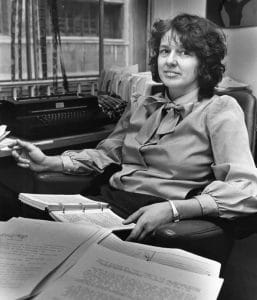As a defense lawyer in Philadelphia, Pa., in the early 1970s, Maguigan noticed a trend: women who were beaten by their husbands, sometimes brutally, had no friends in the justice system. Spousal abuse wasn’t particularly a crime, and if they fought back, sometimes to avoid literally being beaten to death, they were often charged with crimes themselves — especially if they killed their husbands in self defense. Juries didn’t buy the self-defense defenses in court: “Why didn’t she just divorce him?” was the common question. Maguigan started gathering data which proved that most women who used force against their abusive husbands did so during the attack (self defense), not later (revenge). Her findings were published in the University of Pennsylvania Law Review in 1991 at a particularly good time: it backed up the ideas in the 1980 book The Burning Bed, which was adapted into a 1984 TV movie starring Farrah Fawcett as the abused wife. Public opinion about “who’s the victim?” began to change. And she didn’t just defend abused wives: she also defended abused husbands.

“Until the late ’70s and early ’80s, cops rarely made arrests for wife beating,” Maguigan told the Los Angeles Times in a 1991 interview, “because it was assumed that men had the right to control their wives. It goes back to the basic notions of male ownership of women.” After years of defending such cases herself, Maguigan became a professor of law at New York University. Instead of working such cases one by one in the courts, she could show her data to future lawyers and judges while they were still in school. Women, she argued, who are typically smaller, lighter, and less strong than the typical man, were absolutely justified in using weapons to defend themselves against men. It seems obvious today, but in earlier generations, a tiny woman using a gun to defend herself against a man twice her size was often charged with murder and excessive force, since “a man” and “a woman” were ironically judged by the law to be equal combatants.
Women who killed their husbands “didn’t do it because they snapped. They didn’t do it because they’re crazy,” said Sue Osthoff, co-founder of the National Clearinghouse for the Defense of Battered Women. “They did it because they’re defending themselves.” She worked for years with Maguigan, who continued to write law review articles with more and more data, casting light on the unfairness of earlier generations. “Unlike most law professors, what she did and wrote actually had actual impact on real people,” argues Prof. Steve Zeidman of the City University of New York School of Law. “It was trailblazing, and it had an impact. It forced people to realize that there were legitimate self-defense claims.” Helen Hershkoff, who taught with Maguigan at NYU, agrees. “Holly helped create changes in the law, and she trained lawyers able to carry out her new ideas.”

Maguigan was an unlikely candidate for the law. “I really hated lawyers,” she once said during an interview, but saw that they not only helped the unfairly accused, she saw how they worked to change the law to slow down unfair arrests in the first place. She earned bachelor and masters degrees in medieval history before returning to school for her law degree. She rose to the co-president of the Society of American Law Teachers, which in 2014 presented her its Great Teacher Award. She retired from NYU to emerita status in 2021, and died at a hospital in New York on November 15. She was 78.
